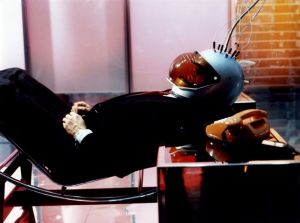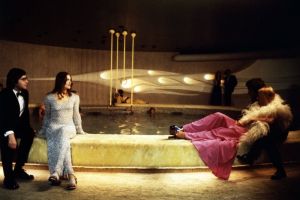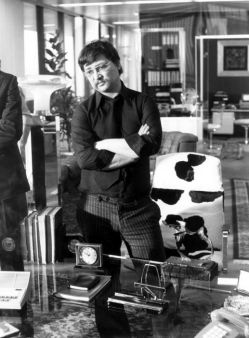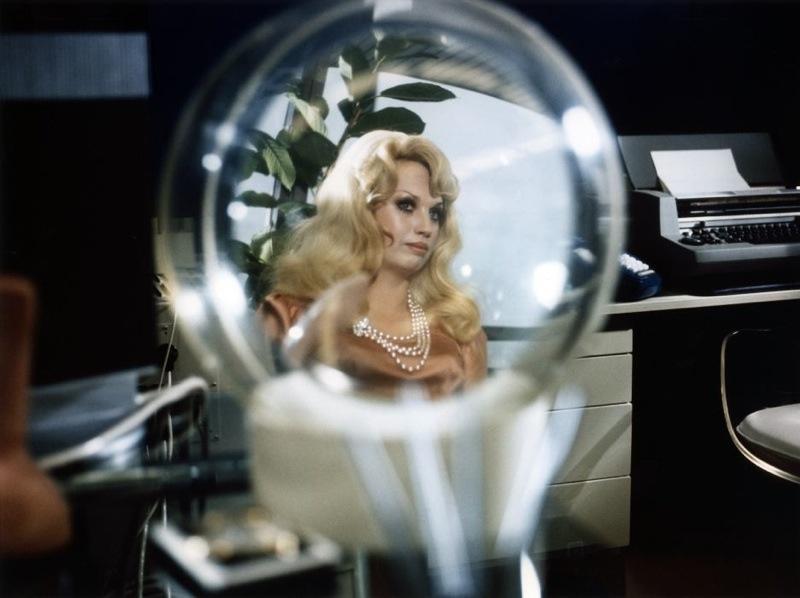Rainer Werner Fassbinder lived fast, died young and left an awful-looking corpse, in 1982, at the age of 37. But not before writing, directing and producing dozens of movies, as well as plays, television series and the odd radio drama or book. Nonetheless, somehow, in between the endless chain of great subversive melodramas that made his name internationally in the mid-1970s, the director found time for this delirious, two-part conspiracy thriller. Rarely seen, long unavailable, it's a visionary acid trip through a not-far-off dystopia, a revelation for fans both of sci-fi/ fantasy and of Fassbinder's work.
Adapted from Daniel F Galouye's 1964 novel Simulacron 3, World on a Wire stars the Fassbinder regular Klaus Löwitsch as one Fred Stiller, a world-weary type who looks like a hard-smoking, hard-drinking, fedora-wearing private eye, but in fact is an executive for a mysterious institute developing a parallel virtual reality that will forecast social and economic trends (a shadowy steel corporation is implicated too). When one colleague commits suicide and another abruptly disappears, then is airbrushed from history, Fred wires up his synapses to voyage into this alternative universe. Paranoia sets in. Who's pulling his strings? Is there a third, higher world manipulating Fred's own? Or a fourth one, a fifth, an infinite mise en abyme? Those questions have exercised us ever since Plato's Republic, and writers and especially filmmakers have been drawn back to them repeatedly (what else, after all, is cinema but Plato's shadows on the cave wall?) In its special obsession with the conspiratorial relationship between the State and cutting-edge technology, World on a Wire taps into 2001: A Space Odyssey and anticipates tropes in Blade Runner, AI: Artificial Intelligence, The Matrix, even Avatar, years before those films were even a gleam in their directors' viewfinders.
Those questions have exercised us ever since Plato's Republic, and writers and especially filmmakers have been drawn back to them repeatedly (what else, after all, is cinema but Plato's shadows on the cave wall?) In its special obsession with the conspiratorial relationship between the State and cutting-edge technology, World on a Wire taps into 2001: A Space Odyssey and anticipates tropes in Blade Runner, AI: Artificial Intelligence, The Matrix, even Avatar, years before those films were even a gleam in their directors' viewfinders.
It also reflects Fassbinder's life-long obsession with how we're constructed and constrained by society. And it is Germanic to its very marrow. The rank, lingering perfume of the Third Reich pricks the nostrils in certain scenes. So too does the contemporary malaise that had spawned the 1968 Emergency Laws, with their assault on civil liberties, and the Baader-Meinhof gang (Fassbinder later bared his soul about this scorchingly in the 1978 collective protest film Germany in Autumn ,as well as in The Third Generation). It goes without saying that, in Britain and the western world in 2010, that particular subtext has lost not a smidgen of its urgency. But all this is not the main reason for seeing the film(s). Although the current, beautifully restored version was screened at the Berlin Film Festival and played last month at New York's Museum of Modern Art, World on a Wire was made for German television. However, I've seen it twice now on the big screen and can attest that, visually, it's sumptuous, imaginative and in no way trammelled by the modest budget and TV format.
But all this is not the main reason for seeing the film(s). Although the current, beautifully restored version was screened at the Berlin Film Festival and played last month at New York's Museum of Modern Art, World on a Wire was made for German television. However, I've seen it twice now on the big screen and can attest that, visually, it's sumptuous, imaginative and in no way trammelled by the modest budget and TV format.
Like Jean-Luc Godard (to whose Alphaville it bears a faint family resemblance - like that film, it was even shot in outer Paris), Fassbinder didn't need whizzy special effects to create a deeply strange, utterly distinctive futureworld. The production design is a heightened version of 1970s kitsch. The omnipresent music track is not quite muzak - there's the Liebestod, the Blue Danube Waltz, synthesised Bach, Fleetwood Mac's Albatross - but is deployed to a sinister and narcotic effect. And, shot by his regular Director of Photography Michael Ballhaus, with whom he made 16 films, each frame bears Fassbinder's unmistakable imprint, with reflections, fractured spaces and the camera constantly prowling and exploring in long - sometimes stupendously extended and complex - tracking shots. Watch and marvel at the matchless technical virtuosity of the director, then aged 27. (You can watch a clip from it here.)
The performances are marked by the highly mannered and affectless acting of Fassbinder's regular repertory company, which was often compared to Andy Warhol's Factory group. Some audiences have found this house style distracting in the director's realist melodramas, such as The Bitter Tears of Petra von Kant, Fear Eats the Soul or The Marriage of Maria Braun. Here, it's perfectly fitted to the themes of simulacra and second lives. There is a single extra in this set: a documentary by Juliane Lorenz, Fassbinder's former editor and (she claims controversially) life partner, as well as the custodian of his flame at the Rainer Werner Fassbinder Foundation, which sponsored this restoration. Her 49-minute film includes interviews with the co-writer, actor Karl Heinz Vosgerau and Ballhaus, who now works in the US, inter alia for Martin Scorsese. There are some interesting behind-the-scenes stories but the heart-stopping moment is the dedication at the end, to the legions of actors and crew members who have died since the film was completed.
There is a single extra in this set: a documentary by Juliane Lorenz, Fassbinder's former editor and (she claims controversially) life partner, as well as the custodian of his flame at the Rainer Werner Fassbinder Foundation, which sponsored this restoration. Her 49-minute film includes interviews with the co-writer, actor Karl Heinz Vosgerau and Ballhaus, who now works in the US, inter alia for Martin Scorsese. There are some interesting behind-the-scenes stories but the heart-stopping moment is the dedication at the end, to the legions of actors and crew members who have died since the film was completed.
In certain ways, Fassbinder (pictured right, on the set of World on a Wire) was a self-destructive personality who both fascinated, exploited and royally screwed up the large entourage he gathered around him. While he was alive, he was one of the most exciting directors on the planet. After his death, his emotional intensity fell from fashion. But film-makers from Pedro Almodóvar and François Ozon to Todd Haynes continued to acknowledge his influence and now, with the recent release of 17 of his features in a double DVD box set, his work is being rediscovered by younger audiences. World on a Wire is an unmissable addition to the canon.
- Find World on a Wire and Simulacron 3 on Amazon.















Add comment